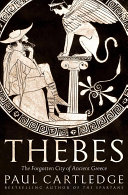
Thebes
The Forgotten City of Ancient Greece
کتاب های مرتبط
- اطلاعات
- نقد و بررسی
- دیدگاه کاربران
نقد و بررسی

July 15, 2020
Eminent classicist Cartledge examines the history, mythical and proven, of an ancient Greek city that is often overlooked in standard texts. Located in the province of Boeotia, Thebes was "almost continuously inhabited for five millennia, at one point the most powerful city in all ancient Greece." It was unusual in having been founded, in legend, by a non-Greek, a refugee from what is now Palestine named Cadmus, who sowed a slain dragon's teeth on the city site and harvested a mighty army. Cadmus, the legend continues, married Harmonia, the child of an adulterous affair between the god of war and the goddess of love, to unhappy result: "the near-total (metaphorical, moral) ruin of Thebes and frequent disasters for their mortal descendants." In real life, Thebes was too close to Athens for comfort, and Athens often waged war against Thebes as a result. It was also relatively close to Sparta, Corinth, and other sometime rivals and sometime allies, and it was in the path of the invading Persians during the reign of Xerxes, when Theban soldiers died nobly alongside Spartans and Athenians at Thermopylae. In the pivotal fifth century B.C.E., writes Cartledge, "mainland Greek history can be seen as playing out within the frame of the fateful Thebes-Athens-Sparta triangle." The Thebes of history too often suffered loss. Against this, writes the author, stands the Thebes of myth, with an equally unhappy history: It was the home of Oedipus and Electra, yielding what is widely considered the best of all the Greek tragedies, Sophocles' cycle of Theban plays. Thebes was also the home of the musician Pronomus, who "was the first to be able to play the three harmonies or modes known ethnically as the Dorian, the Phrygian, and the Lydian on one and the same, enhanced (double) aulos." The cultural contributions were many, but all the same Thebes was overshadowed, and Cartledge's well-paced, illuminating survey shows why that should not be the case. A welcome addition to any philhellenic library by a reliable, readable interpreter of the ancient past.
COPYRIGHT(2020) Kirkus Reviews, ALL RIGHTS RESERVED.

July 13, 2020
Historian Cartledge (Democracy: A Life) explores the mythic origins and enduring legacy of the ancient Greek city of Thebes in this comprehensive account. Though frequently overshadowed by rival city-states Athens and Sparta, Thebes played an integral role in the achievements and culture of ancient Greece, according to Cartledge, who brings the city back to life through the myths of Oedipus and Heracles, the dramas of Pindar and Sophocles, and the histories of Herodotus, Thucydides, Xenophon, and Plutarch. Cartledge also notes that, though Thebes committed the treacherous act of “medism” by siding with Persia in its invasion of Greece in 480 BCE, Theban soldiers fought alongside the Spartan army at the Battle of Thermopylae. Liberated from Athenian rule by Sparta’s victory in the Peloponnesian War, Thebes became the “single greatest power and power broker of mainland Greece” between 371 and 362 BCE, Cartledge writes. Though it was destroyed by Alexander the Great in 335 BCE, Thebes was eventually refounded and flourished in relative peace under Roman, Byzantine, and Ottoman rule. Cartledge concludes with an illustrative rundown of Theban influences on Western culture, including Shakespeare’s Hamlet and the theories of Sigmund Freud. Diving deep into centuries’ worth of scholarship, Cartledge manages to make the ancient world accessible to modern readers. This deeply informed and richly detailed chronicle restores Thebes to its rightful place in history.

























دیدگاه کاربران